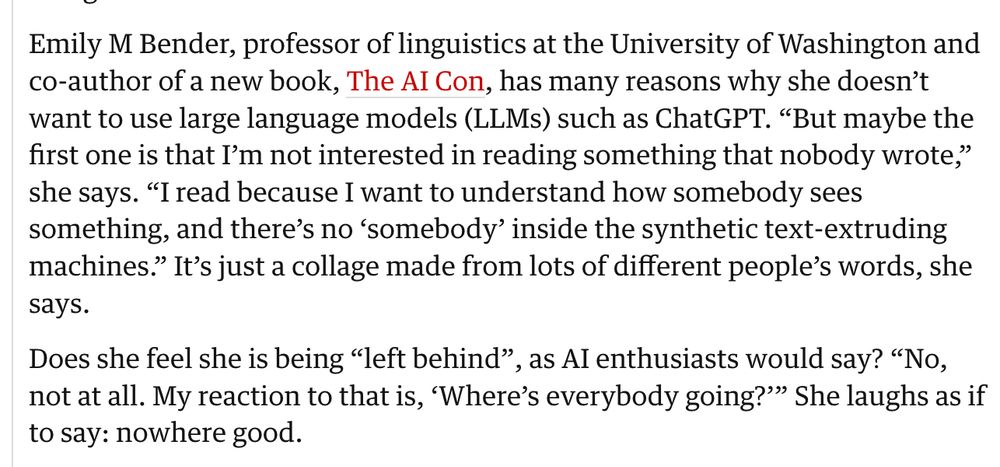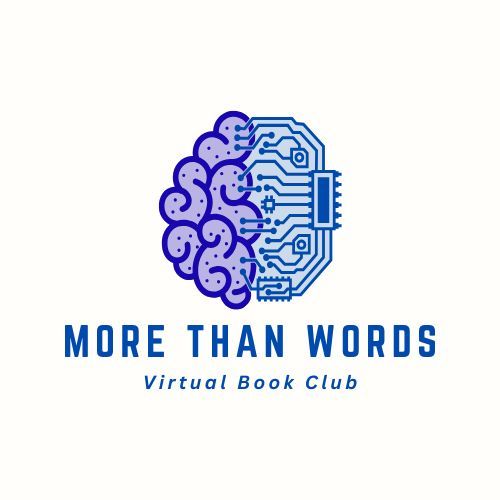Exactly—it’s this grassroots, intrinsically-motivated approach that I’m hoping to propose for our faculty PD!
31.01.2026 20:16 — 👍 2 🔁 0 💬 0 📌 0
Thanks so much. Sounds like a wonderful opportunity for you all!
31.01.2026 20:14 — 👍 1 🔁 0 💬 0 📌 0
Any incentive for students to attend, or is it based on their personal interests?
Hope you get a good turnout!
Sorry for the Q’s — am thinking about proposing something similar for faculty PD. Changing the narrative from sit-and-get to active learning with & alongside students!
31.01.2026 20:07 — 👍 0 🔁 0 💬 1 📌 0
Does your uni pay for the books or must students purchase them?
31.01.2026 19:41 — 👍 1 🔁 0 💬 1 📌 0
"I refuse." This is it. There's no reason we should accept a narrative of an already settled future which marginalizes humans and individual agency. No one wants this. No one asked for it.
19.12.2025 13:21 — 👍 883 🔁 372 💬 2 📌 3
Agreed—rejection often feeds imposter syndrome. Each rejection helps us uncover & understand how Ss feel, especially when traditional grading impacts them at their most vulnerable moments (like in writing). Better to build a compassionate environment where correction builds rather than tears down.
18.12.2025 22:11 — 👍 3 🔁 0 💬 1 📌 0
“When you allow a machine to summarize your reading, to generate the ideas for your essay, and then to write that essay, you’re not learning how to read, think, or write.“
30.11.2025 09:40 — 👍 236 🔁 80 💬 5 📌 8
Just in case you're reading abt concerns over the AI bubble bursting, @emilymbender.bsky.social & @alexhanna.bsky.social predicted the aftermath: more contingent laborers, doing more with less, and a "thick, sooty grime of limitless tech expansionism" that coats "creative industries." #AIResistance
19.11.2025 15:02 — 👍 3 🔁 1 💬 0 📌 0
Thanks for the mention, Josh!
18.11.2025 19:40 — 👍 2 🔁 0 💬 0 📌 0
#AIResistance ⬇️
14.11.2025 21:03 — 👍 5 🔁 1 💬 0 📌 0
This issue of Zeal has two Provocations & Occasions essay: one on teaching race in philosophy classes and one of resisting GAI to protect our students humanity by @dbuckedu.bsky.social.
14.11.2025 18:49 — 👍 2 🔁 1 💬 1 📌 1
Vol. 4 No. 1 (2025)
| Zeal: A Journal for the Liberal Arts
Check out the latest issue of Zeal: A Journal for the Liberal Arts!
zeal.kings.edu/zeal/issue/v...
14.11.2025 18:49 — 👍 4 🔁 1 💬 1 📌 0
Just added you—thanks!
09.11.2025 03:33 — 👍 1 🔁 0 💬 0 📌 0
A terrific starter pack that’s making the rounds again; proud to be on the roster #AIresistance #resistAI
08.11.2025 20:22 — 👍 7 🔁 2 💬 0 📌 0

That first incredulous "what?" made me cheer. Meanwhile, the disconnect between creatives and AI hypers grows to a chasm.
#writersky #AI #edusky #writesky #AIresistance #AIrefusal
17.10.2025 17:04 — 👍 35 🔁 11 💬 1 📌 2
#AIResistance
10.10.2025 19:45 — 👍 5 🔁 0 💬 0 📌 0
As a FYW instructor (mostly online), students seem to research more responsibly & ethically when exploring topics for which they are passionate. Instead of depending on the “answer machine” spitting out AI slop, they are more motivated to use credible, authoritative sources. The kids are alright!
03.10.2025 12:10 — 👍 4 🔁 0 💬 0 📌 0
A talking point to add — Alternative grading approaches de-incentivize students’ use/dependence on AI slop way better than horrible, unreliable surveillance software which only create a culture of suspicion. When we reform traditional grading, we open ourselves to human trust & learning potential.
01.10.2025 18:49 — 👍 11 🔁 2 💬 1 📌 0
Just added. 👍🏼
26.08.2025 17:41 — 👍 2 🔁 0 💬 1 📌 0
Reminds me of a recent news story about a bank that fired its customer service staff & replaced them with an AI-powered chat bot. Of course, the bot performed so poorly that the bank’s management had to scramble to rehire the human staff. If all labor is efficiency & productivity, this is expected.
25.08.2025 17:58 — 👍 1 🔁 0 💬 0 📌 0
Another argument for resisting the myth held by many in higher education that if we don’t teach “AI literacy,” our students will be left behind. When the ultimate goal of our labor should be encouraging our students to develop their critical thinking and learning abilities—basically, being humans.
25.08.2025 17:49 — 👍 9 🔁 1 💬 1 📌 0
Yup—that about sums it up. What’s more sad to admit is that the original creators of Canvas possessed an honest approach to pedagogy and learning (IMHO), but this original intent has definitely been corrupted by profit & money-driven ownership. Though imperfect, the originating vision is long gone.
24.07.2025 16:55 — 👍 1 🔁 0 💬 0 📌 0
My community college was one of the 1st institutions to adopt Canvas in 2012. We were very early adopters. It was pitched as a pedagogical-focused system designed to “get out of the way” of an instructor’s teaching approach. Never imagined that it now is set up to REPLACE that instructor!
24.07.2025 15:24 — 👍 6 🔁 0 💬 1 📌 0
Since the SAT essay became optional + scored by AI, I can't begin to tell you the number of people who have asked me why they should still teach writing, as if the only reason for kids to write is to score well on a standardized test.
Also, this reveals how much College Board impacts practice.
22.06.2025 17:40 — 👍 17 🔁 5 💬 1 📌 0
Chatbots — LLMs — do not know facts and are not designed to be able to accurately answer factual questions. They are designed to find and mimic patterns of words, probabilistically. When they’re “right” it’s because correct things are often written down, so those patterns are frequent. That’s all.
19.06.2025 11:21 — 👍 36887 🔁 11368 💬 633 📌 961
Today's complaint about the AI in education discourse: Too much of it is framed around a future that is going to happen to us, as opposed to seeing the future as something we may have some agency to shape. I reject the deterministic view of AI, particularly genAI. It's a tool, not our master.
18.06.2025 13:02 — 👍 388 🔁 87 💬 10 📌 20
The ungrading book club (organized by the indefatiguable @dbuckedu.bsky.social) is reading @biblioracle.bsky.social's fantastic book, More than Words, about exactly why we should be helping students understand the value of critical thinking and other challenging cognitive work.
18.06.2025 14:24 — 👍 15 🔁 5 💬 1 📌 0

Screencap from linked article, with text: "Emily M Bender, professor of linguistics at the University of Washington and co-author of a new book, The AI Con, has many reasons why she doesn’t want to use large language models (LLMs) such as ChatGPT. “But maybe the first one is that I’m not interested in reading something that nobody wrote,” she says. “I read because I want to understand how somebody sees something, and there’s no ‘somebody’ inside the synthetic text-extruding machines.” It’s just a collage made from lots of different people’s words, she says.
Does she feel she is being “left behind”, as AI enthusiasts would say? “No, not at all. My reaction to that is, ‘Where’s everybody going?’” She laughs as if to say: nowhere good."
I appreciate this piece, but I want to correct the record on one point. I don't talk about LLMs as making "collages" but rather as making papier-mâché, and the difference matters!
>>
www.theguardian.com/technology/2...
04.06.2025 16:01 — 👍 115 🔁 28 💬 4 📌 1

Image of a brain merged with a computer chip. Under the image are the words: More Than Words Virtual Book Club
Had a great session of the #MoreThanWords virtual book club yesterday!
A wonderful group of caring, compassionate educators hoping to guide their students through the ubiquitous sludge of GenAI.
We focused on writing as thinking, a uniquely human endeavor rather than a transactional experience.
04.06.2025 15:21 — 👍 5 🔁 0 💬 0 📌 1
Prof. Royal Military College of Canada
Expert on tech, far-right extremism & terrorism tactics | Ph.D. in International Relations | Author of 'How Terror Evolves' and currently working on 'Uniformed Threats.'
Views = Mine
Guidebook author, TV & radio host, business owner, Lutheran, and NORML Board Member. Fanatically positive and militantly optimistic.
Canadian dad, teacher, and writer (say it like “dine in”)
Historian: of American religion/irreligion by training; of science & conspiracy by trade
dumb jokes about smart things and smart jokes about dumb things
Podcast research/factcheck: SNAFU with Ed Helms; The Reason We're All Still Here; My Fugitive, more
Interested in the moving image, who, why, when, where 📽 🎬 📺 🎞
Sociologist, UIowa Associate Professor and author of On Critical Race Theory. Vice-President American Sociological Association. Former BIGS Racial Equity Fellow at Harvard Business School.
Associate Professor of History & African American Studies, Wayne State University. Brazilian historian in the US. Interested in LLMs for research and wary of its impacts on learning and society. Opinions are my own and do not reflect my employer. PT/ENG.
Population genetics, conservation genetics, whales, teaching, cycling
frasierlab.ca
https://danmcquillan.org/
Led by @anna-phd.bsky.social, the Education Now Lab is a community-engaged research+practice lab engaging in & producing a range of public, academic & new media scholarship toward education justice.
Writer, Coach (2009 International Coach of the Year), Founder of the Soul Path Academy -- we evolve faster together 💙
Animal lover, foodie, social justice fanatic, polymath, planet saver, queer, spiritual-but-not-religious Buddhist
https://brightwings.com
Poet, Alumna of @CBSNews @60Minutes @BBCWorld @FaberAcademy. Love @britishlibrary & @VanguardRead #amwriting #poetry #visual #journal #travellingwithdevices 🧶 #crochet #StitchingTogether for the #CommonGood
Divorced, Designer, Biologist, Alchemist
#RA #EDS #CROHNS #AS #blind #neurodivergent, parent of a deaf / autistic child #medicalcannabis #snails #shrimp #AriesIncarnate #wikipedia #aerogarden coma survivor, near death experience, general spatchcockery
Journalist @404Media.co
Signal: jason.404 // email: jason@404media.co
Historian // author of THE DEFIANT (post ‘60s US politics/protest) and TEENAGE REBELS (teen activism history, for teens) & co-author of PUNKS IN PEORIA (DIY in a small town) // "Picking up where Zinn left off..." (trying anyway!) // dawsonbarrett.com
Americanist Military Historian & Genocide Scholar.
Kean University History Adjunct.
Expat Twitterstorian. Skystorian.
Cancer Survivor. He/Him.
https://linktr.ee/deckofcarterhistory
Sociologist studying race, class, & environment. Author of The Business of Racism: Labor and Environment in Brazil's Racial Capitalism (Duke University Press). PhD from UW-Madison. Former NSF SPRF Postdoc at UCSB. He/Him/His.
https://www.iancarrillo.com/
Prof @UW-Madison. Ed Policy, Anthro, Multilingual literacies, Migration. Açaí enthusiast.
Milwaukean, medical librarian, crafter.
Pol Sci Prof at CalLutheran. Author of "You Must Become an Algorithmic Problem" (Bristol Univ Press) and "Machine Liberalism" (Forthcoming from Intellect Books/University of Chicago Press)
https://josemarichal.github.io/



